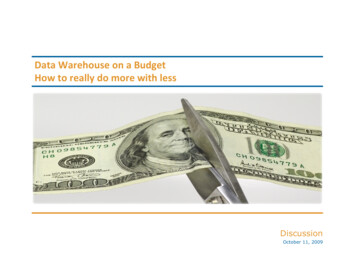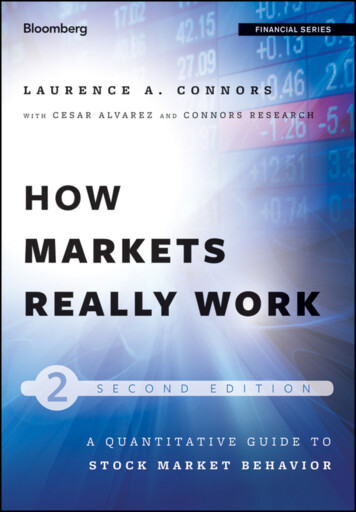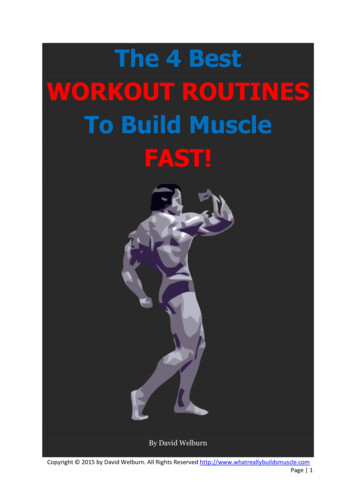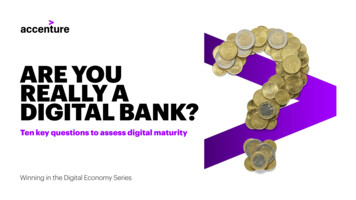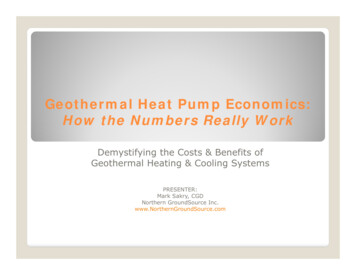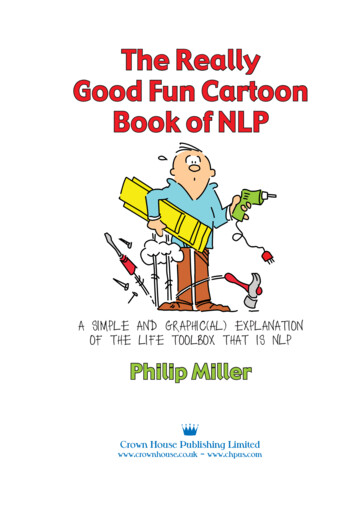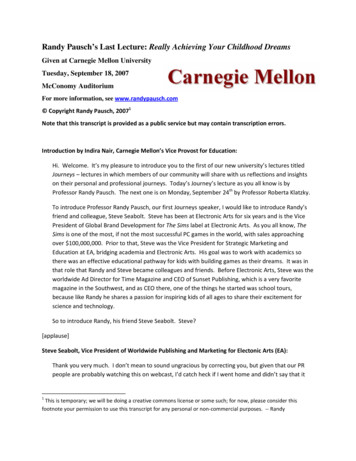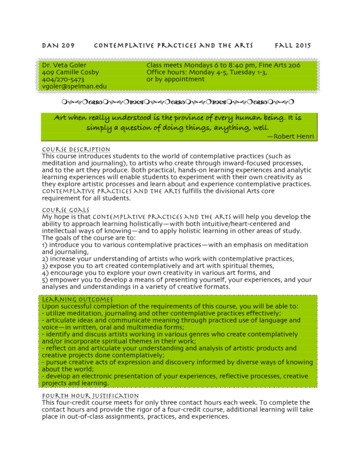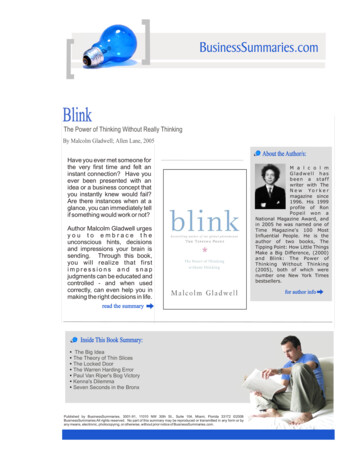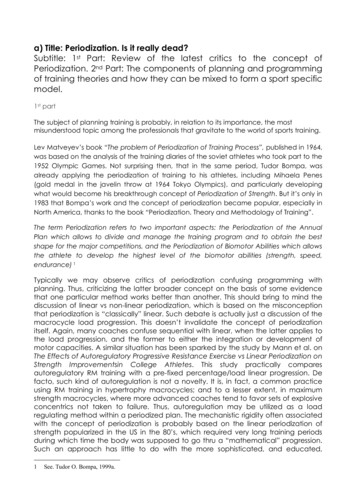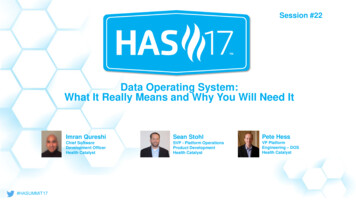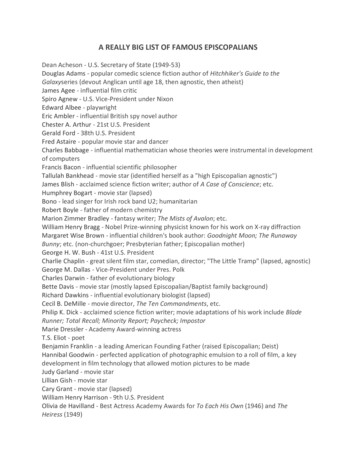
Transcription
A REALLY BIG LIST OF FAMOUS EPISCOPALIANSDean Acheson - U.S. Secretary of State (1949-53)Douglas Adams - popular comedic science fiction author of Hitchhiker's Guide to theGalaxyseries (devout Anglican until age 18, then agnostic, then atheist)James Agee - influential film criticSpiro Agnew - U.S. Vice-President under NixonEdward Albee - playwrightEric Ambler - influential British spy novel authorChester A. Arthur - 21st U.S. PresidentGerald Ford - 38th U.S. PresidentFred Astaire - popular movie star and dancerCharles Babbage - influential mathematician whose theories were instrumental in developmentof computersFrancis Bacon - influential scientific philosopherTallulah Bankhead - movie star (identified herself as a "high Episcopalian agnostic")James Blish - acclaimed science fiction writer; author of A Case of Conscience; etc.Humphrey Bogart - movie star (lapsed)Bono - lead singer for Irish rock band U2; humanitarianRobert Boyle - father of modern chemistryMarion Zimmer Bradley - fantasy writer; The Mists of Avalon; etc.William Henry Bragg - Nobel Prize-winning physicist known for his work on X-ray diffractionMargaret Wise Brown - influential children's book author: Goodnight Moon; The RunawayBunny; etc. (non-churchgoer; Presbyterian father; Episcopalian mother)George H. W. Bush - 41st U.S. PresidentCharlie Chaplin - great silent film star, comedian, director; "The Little Tramp" (lapsed, agnostic)George M. Dallas - Vice-President under Pres. PolkCharles Darwin - father of evolutionary biologyBette Davis - movie star (mostly lapsed Episcopalian/Baptist family background)Richard Dawkins - influential evolutionary biologist (lapsed)Cecil B. DeMille - movie director, The Ten Commandments, etc.Philip K. Dick - acclaimed science fiction writer; movie adaptations of his work include BladeRunner; Total Recall; Minority Report; Paycheck; ImpostorMarie Dressler - Academy Award-winning actressT.S. Eliot - poetBenjamin Franklin - a leading American Founding Father (raised Episcopalian; Deist)Hannibal Goodwin - perfected application of photographic emulsion to a roll of film, a keydevelopment in film technology that allowed motion pictures to be madeJudy Garland - movie starLillian Gish - movie starCary Grant - movie star (lapsed)William Henry Harrison - 9th U.S. PresidentOlivia de Havilland - Best Actress Academy Awards for To Each His Own (1946) and TheHeiress (1949)
Thomas A. Hendricks - U.S. Vice-President under ClevelandRobert Hooke - English scientist; formulated the law of elasticity; proposed a wave theory oflightThomas Jefferson - 3rd U.S. President (raised Episcopalian; Deist)Edward Jenner - medical scientist who made vaccination for smallpoxWilliam Thomson, Lord Kelvin - important thermodynamics physicistC.S. Lewis - author, novelist, theologian, philosopher; Mere Christianity; The Chronicles ofNarnia; etc. (born into Church of Ireland)John Locke - philosopherJames Madison - 4th U.S. PresidentGuglielmo Marconi - inventor of the radioJames E. McGreevey - first openly GLBT U.S. governor (New Jersey); resigned after gayadultery/nepotism/security scandalVictor McLaglen - Best Actor Academy Award forThe Informer, 1935 (Anglican)Harriet Miers - White House general counsel; nominated by Pres. Bush to be on U.S. SupremeCourt (never confirmed)James Monroe - 5th U.S. PresidentVan Morrison - singer (Church of Ireland)Nevill Mott - Nobel Prize-winning physicist; explained the effect of light on a photographicemulsionGeorgia O'Keeffe - famous American painter (nominal)Laurence Olivier - movie star (agnostic, but a dedicated Anglican)John Ostrander - comic book writerFranklin Pierce - 14th U.S. PresidentSidney Poitier - movie star (Anglican while young)Norman Rockwell - famous American painter (lapsed Episcopalian)Franklin Delano Roosevelt - 32nd U.S. PresidentTheodore Roosevelt - 26th U.S. President (Dutch Reformed, but attended Episcopaliancongregation)Dante Gabriel Rossetti - famous painterGeorge Bernard Shaw - influential Irish playwright; received Nobel Price in Literature; founderof the Fabian Society (raised in Church of Ireland; later atheist, then mystic)Cordwainer Smith - science fiction writerDavid Souter - U.S. Supreme Court justice since 1990John Steinbeck - prominent American novelist (The Grapes of Wrath; etc.)Laurence Sterne - influential author in 1700s; wrote Tristram Shandy (clergyman in Church ofIreland)Zachary Taylor - 12th U.S. PresidentAlfred Lord Tennyson - influential writerJoseph J. Thomson - Nobel Laureate in Physics, discoverer of the electron, founder of the fieldof atomic physicsJohn Tyler - 10 U.S. PresidentMatthew Tindal - philosopher of deismHenry A. Wallace - U.S. Vice-President under F.D. Roosevelt
George Washington - 1st U.S. PresidentOscar Wilde - influential Irish playwright, novelist, poet, story writer (raised in Church ofIreland; deathbed conversion to Catholicism)Tennessee Williams - playwrightWilliam Butler Yeats - W.B. Yeats was an influential Irish poet; received Novel Prize forLiterature (Church of Ireland)Some additional U.S. Senators who were Episcopalians:Ted Stevens - AlaskaBarry Goldwater - ArizonaJohn McCain - Arizona (1987-)Blanche Lincoln - ArkansasPrescott Bush - Connecticut (1952-63)Bill Nelson - FloridaSaxby Chambliss - GeorgiaEvan Bayh - IndianaWilliam Dodd Hathaway - Maine (1973-79)Millard E. Tydings - Maryland (1927-51)Charles Mathias - Maryland (1969-87)Stuart Symington - Missouri (1953-76)Chuck Hagel - NebraskaJim Exon - Nebraska (1979-97)James W. Wadsworth, Jr. - New York (1915-27)Robert A. Taft - Ohio 1939-53Robert Latham Owen - Oklahoma (1907-25)Lincoln Chafee - Rhode IslandClaiborne Pell - Rhode Island (1961-97)John H. Chafee - Rhode Island (1976-99)Kay Bailey Hutchison - TexasPhil Gramm - Texas (1985-2002)John Warner - VirginiaHarry F. Byrd - Virginia (1933-65)Harry F. Byrd, Jr. - Virginia (1965-83)Chuck Robb - Virginia (1989-2001)Brock Adams - Washington (1987-93)Alan Simpson - Wyoming (1979-97)Pete Williams - New Jersey/ABSCAM scandalSome additional U.S. Representatives who were Episcopalians:Bill Alexander - Arkansas (1969-93)Bill McCollum - Florida (1981-2001)Jack W. Buechner - Missouri (1987-91)Jo Bonner - Alabama 1st
Don Young - Alaska (1973-)John Shadegg - Arizona 3rdSam Farr - California 17thRob Simmons - Connecticut 2ndAdam Putnam - Florida 12thDan Miller - Florida 13th (1993-2003)Ander Crenshaw - Florida 4thJohn Mica - Florida 7thJack Kingston - Georgia 1stDavid McIntosh - Indiana 2nd (1995-2001)Jim Leach - Iowa 2ndBob Livingston - Louisiana 1st (1977-99)Charles Boustany - Louisiana 7th (2005-)James Symington - Missouri 2nd (1969-77)Rodney Frelinghuysen - New Jersey 11thRobert E. Andrews - New Jersey 1stRandy Kuhl - New York 29th (2005-)Cass Ballenger - North Carolina 10thRalph Regula - Ohio 16thChris Bell - Texas 25thJeb Hensarling - Texas 5thJames McDermott - Washington 7thJim Sensenbrenner - Wisconsin 5th (1979-)Judy Biggert - Illinois 13thBrian Kerns - Indiana 7th (2001-2002)Some additional U.S. Governors who were Episcopalians:Hiram Johnson (1866-1945) - Governor and Senator from CaliforniaFife Symington - Arizona (1991-97)George Deukmejian - California (1983-91)Charles L. Terry, Jr. - Delaware (1965-69)Pete du Pont - Delaware (1977-85)Bill Weld - Massachusetts (1991-97)Kenny Guinn - NevadaMark Sanford - South CarolinaCarroll Campbell - South Carolina (1987-95)Thomas A. Riggs - Territorial Alaska (1918-21)Bob Wise - West VirginiaDave Freudenthal - WyomingStanley K. Hathaway - Wyoming (1967-75)U.S. Supreme Court Chief Justices who were Episcopalians:John Jay
John MarshallSalmon P. ChaseMelville W. FullerMorrison R. WaiteHarlan F. StoneAdditional U.S. Supreme Court Justices who were Episcopalians:Alfred MooreBenjamin R. CurtisBushrod WashingtonByron R. WhiteDavid H. SouterEdward T. SanfordGeorge SutherlandHorace H. LurtonJames F. ByrnesJames IredellJames WilsonJohn A. CampbellJohn RutledgeOwen J. RobertsPeter V. DanielPhilip P. BarbourPotter StewartRobert H. JacksonRufus W. PeckhamSamuel ChaseSandra Day O'ConnorStephen J. FieldThomas JohnsonThurgood MarshallWard HuntWilliam H. MoodyWillis Van DevanterGallery of Famous AnglicansThomas Cranmer (1489-1556). Archbishop of Canterbury and one of the three Anglican Bishopsmartyred in Oxford in the sixteenth century under Queen Mary Tudor. Cranmer is best knownfor being the primary architect of the Book of Common Prayer as well as the author of theThirty-nine Articles of Religion (orginally Forty-two Articles). He was largely responsible for theabolition of the distinctly Roman Catholic ceremonies, the destruction of images and relics, andthe purging of medieval Roman superstitious heresies in the Church of England. He was burnt at
the stake on March 21, 1556, placing his hand first in the flames as an indication of his regret insigning recantations "for fear of death".Charles Simeon (1759-1836). Evangelical divine of the Anglican Church during a time of greatspiritual decline in the Church of England. He held his incumbency at Trinity Church inCambridge for his entire career. At first he met with great resistance to Evangelical preachingbut later seemed to have turned the course of the entire church towards revival. Read more onCharles Simeon in an article on our "Articles Page".George Whitefield (1714-1770). Anglican Evangelist and leader in the earlyMethodist movement. He came under the influence of John and Charles Wesley while studyingin Oxford and soon set about preaching in large open-air meetings. His fervent and eloquentpreaching attracted significant notice and Whitefield became one of the leading figures in theeighteenth century Great Awakening. In his travels to America he became a friend of BenjaminFranklin and founded an orphanage in Georgia. He was the most striking orator in theeighteenth century Revival which swept through England, Scotland, Wales, and America.Charles Fuge Lowder (1820-80) vicar of St. Peter's, London Docks. Educated at Exeter College,Oxford, he was ordained priest in 1844 and in 1851 became curate at the parish of St. Barnabas,Pimlico. In 1856 he joined the staff of St. George's in the East, where he took a leading part inthe first regular mission work in East London, with Alexander H. Mackonochie as his colleaguefrom 1858. His mission work expanded and he built the church of St. Peter's London Docks(1860-6). Fr. Lowder, as he was affectionately known, was instrumental in reviving a highdegree of ritualism in worship, inspiring a renewed depth of spirituality among high churchclergy, and was the primary founder of the Society of the Holy Cross. The 19 century Church ofEngland was lifted from a state of lethargy and irreverence through the untiring labors ofCharles Lowder.(Biographical commentary from the Oxford Dictionary of the Christian Church along with thePh.D. dissertation of Dr. S.D. deHart; Anglo-Catholics and the Vestment Controversy Literature)Alexander Heriot Mackonochie (1825-87) Educated at Wadham college, Oxford, he wasordained in 1849, and served in Westbury and Wantage, before assisting Charles Lowder at St.George's in the East (London). By 1862 when he was put in charge of the newly built church ofSt. Alban's Holborn, he was recognized as a Ritualist and from 1867 onwards he was constantlypersecuted for his ceremonial practices. He eventually resigned in 1882, though he continuedto work in the parish until his sudden death in the Highlands in Dec. 1887. Fr. Mackonochie,though the most persecuted priest of the 19th century, filled St. Alban's with enthusiasticconverts to Christ within the heathen district of Holborn. Complaints against his high churchform of worship were never made by those within his church, but only by those outside whocould not see the value of advanced ceremony accompanying the preaching of the Gospel andadministration of the Sacraments. His efforts to secure frequent Communion and deeperspiritual devotion among the poor of St. Alban's under a great degree of persecution has left amemory of Fr. Mackonochie as "the martyr of St. Alban's." He served as the Master of theSociety of the Holy Cross during many of these difficult years.
(Biographical material from the Oxford Dictionary of the Christian Church along with the Ph.D.dissertation of Dr. S.D. deHart; Anglo-Catholics and the Vestments Controversy Literature)William James Early Bennett (1804-1886) Anglican clergyman known best as the vicar of St.Paul's, Knightsbridge and St. Barnabas, Pimlico in the mid 19th century. Zealous to bring theGospel to the inner city of London, Bennett persuaded the congregation of St. Paul's toestablish a mission, (a chapel of ease) for the poor population in Pimlico. Such an undertakingmarked one of the first efforts for inner city missionary work in the Victorian era. Bennett'swork was greatly appreciated by the people of Pimlico, however despised by the lowchurchmen of the day. Among the complaints against Bennett's ceremonialism at St. Barnabasincluded the use of a cross in the building, the use of candles, an invocation before the sermon,and the procession of the clergy! Rioters were paid to disrupt services and threaten the welfareof the clergy and congregation, even the police could not keep peace inside the building duringthe terrible riots of 1851 at St. Barnabas! Though Bishop Blomfield of London sympathized withBennett, he called for his resignation hoping that the rioting would cease with the removal ofthe church priest and visionary for inner city ministry. Bennett left London and zealouslycontinued his work as vicar of Frome, writing pamphlets, learned treatises, and ministering tothe people of his parish. Sadly, the controversy at St. Barnabas continued as the paid rioterswere willing to ignore the pleas of the Bishop, to ignore the great ministry of preaching theGospel to the poor, and to despise the beauty of worship within St. Barnabas. For an excerpt ofone of Bennett's sermon's preached during the occasion of one of the worst r
A REALLY BIG LIST OF FAMOUS EPISCOPALIANS Dean Acheson - U.S. Secretary of State (1949-53) . but later seemed to have turned the course of the entire church towards revival. Read more on Charles Simeon in an article on our "Articles Page". George Whitefield (1714-1770). Anglican Evangelist and leader in the early Methodist movement. He came under the influence of John and Charles Wesley .
